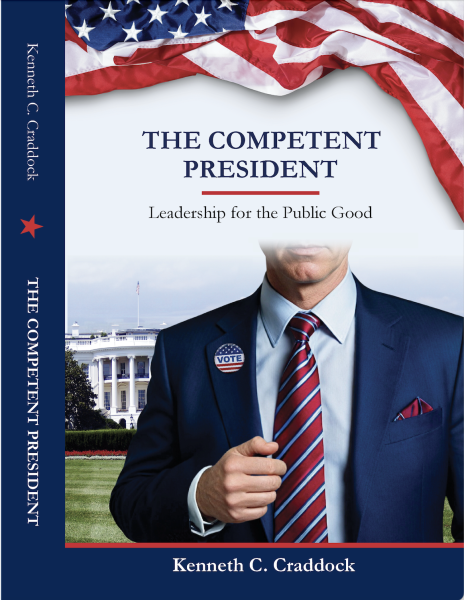The Competent President
Leadership for the Common Good by Ken Craddock - 2025 - FREE DOWNLOAD

Obtain this book
To download a digital copy of this book for free
You need to register for a free GO Society web site account if you don't already have one at https://globalro.org/user/register. Then log into your account at https://globalro.org/user/login. Next, return to this page and you will be able to see and download the file.
Summary - 500-words
"The Competent President: Leadership for the Public Good" by Kenneth C. Craddock argues that the United States has consistently failed to elect a genuinely competent president throughout the 21st century, resulting in unresolved national problems and diminished global leadership. The book’s premise is that voters lack the tools to distinguish true presidential competence—required to effectively manage the complexities of the office—from mere popularity or confidence. Craddock aims to equip citizens with a framework to identify competent candidates before casting their vote, asserting this is crucial for the republic's future.
The core methodology stems from Elliott Jaques's Requisite Organization theory, focusing on cognitive capability and time horizon. Craddock posits that the presidency demands "dynamic logic" (specifically serial or parallel processing within the Abstract Order of Information Complexity) and the ability to plan and foresee consequences across a minimum twenty-year time horizon. Using this lens, the book analyzes presidencies since 1960, when televised debates began offering voters a window into candidates' thinking.
John F. Kennedy and Ronald Reagan are presented as modern examples who demonstrated the requisite dynamic logic and competence, successfully navigating major challenges like the Cuban Missile Crisis and the Cold War's endgame, respectively. Their performance is contrasted with presidents deemed competent but flawed or mismatched (like LBJ and Nixon, assessed as competent but ultimately undone, partly by facing the higher-level strategist Ho Chi Minh) and those assessed as lacking the necessary cognitive level or time horizon, such as Ford, Carter, Bush 41, George W. Bush, Obama, Trump, and Biden. Craddock correlates re-election success at 100% with demonstrated dynamic capability, noting presidents using static logic were more frequently defeated.
The book identifies a widening gap between the cognitive demands of the presidency and the average voter's ability (influenced by electorate expansion and a shift from 'vertical' to 'horizontal' thinking) to perceive these capability differences. It warns against the dangers of absolutism, emphasizing the founders' intent, and highlights 'civic virtue' as a core American value distinct from patriotism or nationalism. Craddock concludes that the electorate's failure to prioritize and identify cognitive competence has led to a leadership deficit, exemplified by the perceived lack of requisite capability in the 2024 major party nominees. The book serves as a call to action for voters to adopt these analytical tools to ensure the election of presidents truly capable of governing for the public good.





